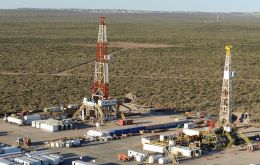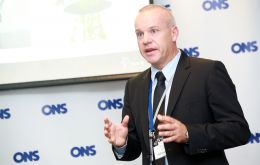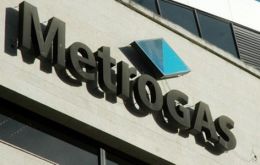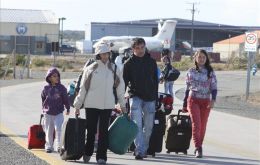MercoPress. South Atlantic News Agency
Tag: gas
-
Wednesday, October 31st 2018 - 08:23 UTC
Argentina resumes natural gas export to Chile after twelve years

Argentina has begun exporting natural gas to Chile after a 12 year interlude, Chilean President Sebastian Piñera said on Tuesday, as the two neighboring countries seek to increasingly integrate their energy supply and electricity grids.
-
Sunday, October 28th 2018 - 19:25 UTC
Argentina seeks extension on due Bolivian gas bills

Argentina's cooking gas company Integración Energética Argentina S.A. (formerly Enarsa) has asked Bolivia's Yacimientos Petrolíferos Fiscales Bolivianos (YPFB) for an extension to pay up the bills for the past two months plus interests due since 2007, it was reported.
-
Friday, August 31st 2018 - 08:29 UTC
Norway's Equinor plans to invest US$ 15bn in Brazil's oil, gas and renewables

Norway's Equinor will invest up to US$ 15 billion in Brazil over the next 12 years to develop oil, gas and renewable energy sources, the company said. Coinciding with an expected drop in output from many aging oilfields off the cost of Norway, Brazil is expected to become a core region for Equinor as the firm takes advantage of the country’s opening in recent years to more foreign investment.
-
Wednesday, December 27th 2017 - 14:54 UTC
Gasoline, another kind of business in Venezuelan scarcity

It is paradoxical how a country with the largest oil reserves in the world has a shortage of gasoline. Of course, Venezuela does not produce gasoline as such, but sells crude oil and imports gasoline, so with the sanctions imposed by various nations and the very crisis that PDVSA (State Company) suffers - which according to the unions works approximately 13% of its capacity- complicate the problem.
-
Saturday, April 5th 2014 - 03:05 UTC
The most profitable gas in the world

By Robert Bensh of Oilprice.com - There is only one certainty in Ukraine: The energy sector must and will be transformed, and how long this takes will depend on who ends up in the driver's seat and how serious they are about becoming a part of Europe and reducing dependence on Russia. But by then, investors will have missed the boat.
-
Friday, July 1st 2011 - 06:59 UTC
Qatargas will provide Argentina with LNG on a 20 year supply agreement

Qatar’s leading corporation Qatargas has signed an agreement with Argentina’s government owned oil and gas company, ENARSA for the long-term supply of liquefied natural gas (LNG).
-
Monday, June 6th 2011 - 05:57 UTC
YPF ready to take control of Argentina’s main gas distributor

Argentina’s oil corporation YPF signed a purchase option for 54.67% of the British Gas controlled GASA group that is the country’s largest distributor of gas. The purchase option expires August 31.
-
Thursday, January 20th 2011 - 23:52 UTC
Sixty Percent of Visits Cancelled to Southern Chile

Seven days of protests and demonstrations, widespread international coverage, and dramatic warnings of violence in the Magallanes Region took their toll on the tourism industry in southern Chile’s Punta Arenas.
-
Tuesday, January 18th 2011 - 01:04 UTC
Gov. Rios warned that the industry was already experiencing “problems” due to the Chilean blockade

The Governor of Tierra del Fuego announced on Radio 10 that they are awaiting the results of the meetings taking place in Chile to resolve the conflict in Punta Arenas which is affecting Argentine tourists.
-
Monday, January 17th 2011 - 16:34 UTC
Chile: Mayor Critisized Piñera’s Government for Invoking Security Law to Stop Protests

Vladimiro Mimica, Mayor of Punta Arenas, expressed that the measures taken by Sebastián Piñera’s government to invoke the Security Law in order to stop protests in Magallanes due to gas price hikes were “an overaction and inopportune”.
